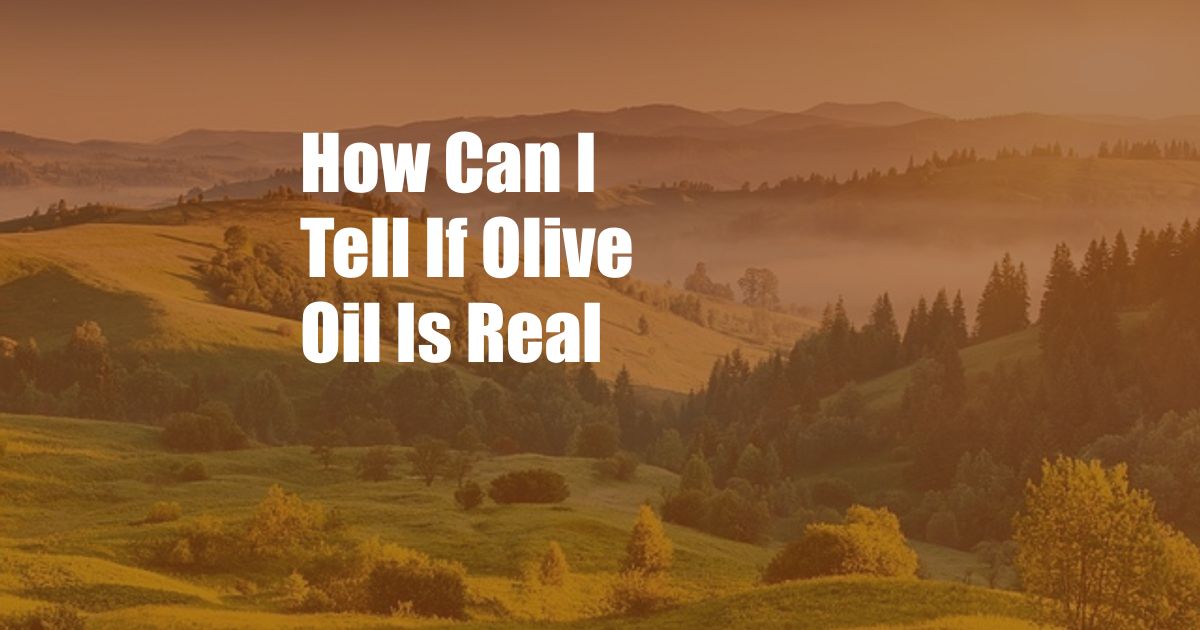
How to Tell if Olive Oil Is Real: A Guide to Identifying Authentic Olive Oil
Have you ever wondered if the olive oil you’re using is the real deal? As a lover of authentic Mediterranean cuisine, I’ve been on a quest to find out how to distinguish real olive oil from impostors. Join me on this journey of discovery as I share my insights and tips on identifying genuine olive oil.
The Importance of Authenticity
Olive oil is a culinary staple and a health-promoting ingredient. However, the market can be flooded with fraudulent products that compromise the integrity and potential benefits of real olive oil. Identifying authentic olive oil is crucial for your taste buds and overall well-being.
Characteristics of Real Olive Oil
1. Check the Label:
Look for olive oil labeled “extra virgin,” which indicates the highest quality obtained through cold pressing without chemical treatment. Check for harvest dates and origin to ensure freshness and authenticity.
2. Smell and Taste:
Real olive oil exudes a distinct fruity aroma reminiscent of fresh-cut olives. Avoid oils with rancid, musty, or overly strong scents. Upon tasting, authentic olive oil should have a slightly bitter and peppery finish, indicating the presence of antioxidants.
3. Color and Appearance:
Pure olive oil can range from golden green to golden yellow. Avoid oils that are too dark or have a cloudy appearance, as these may be diluted with other oils or contain impurities.
Advanced Techniques for Detection
1. The Freeze Test:
Place a spoonful of olive oil in the freezer for an hour. Real olive oil will become cloudy and may solidify due to the presence of waxes and fatty acids. If it remains liquid, it may not be genuine.
2. The Water Test:
Mix a tablespoon of olive oil with two tablespoons of hot water in a glass. Pure olive oil will emulsify and create a milky white mixture, while fake oils will separate into distinct layers.
3. The Smell Test:
Heat a small amount of olive oil in a pan until it smokes. Real olive oil will produce a fruity aroma, while rancid or diluted oils will release unpleasant odors.
Expert Advice for Navigating the Market
1. Buy from Reputable Sources:
Seek olive oil from specialty stores, reputable online retailers, or directly from trusted producers who adhere to strict quality standards.
2. Be Wary of Price Points:
Extra virgin olive oil is a premium product and should not be excessively cheap. Avoid suspiciously low prices, as they may indicate lower-quality oils.
Frequently Asked Questions
Q: Can I use olive oil for cooking?
A: Yes, extra virgin olive oil is considered an excellent cooking oil due to its high smoke point and health benefits.
Q: How long can I store olive oil?
A: Store unopened olive oil in a cool, dark place for up to two years. Once opened, consume within six months.
Q: Is olive oil safe for frying?
A: Due to its low smoke point, extra virgin olive oil is not recommended for deep-frying. However, it can be used for shallow-frying at medium temperatures.
Conclusion: Embracing the Authentic
Identifying real olive oil is an essential skill for culinary enthusiasts and health-conscious individuals. By following the tips and techniques outlined above, you can confidently elevate your cooking and maximize the benefits of this liquid gold.
So, dear readers, are you ready to embark on this journey of olive oil discovery? Remember, the key to a fantastic culinary and health experience lies in embracing the authentic.